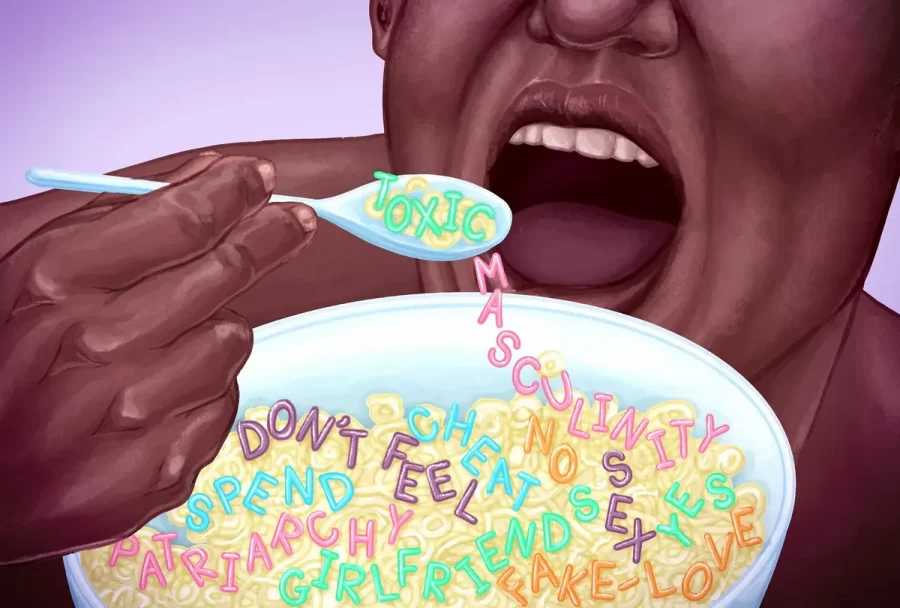Men’s Mental Health Month: The Impact of Toxic Masculinity
November 12, 2021
Sexism is a tool that fiercely targets women at large, but subsequently impacts the perpetrators of it as well. Though women are statistically more suicidal, it is men who lead with the highest committed suicide rates nationwide. The patriarchy that aims to keep women inferior is not always one-sided, as men are subjected to the harmful toxic masculine traits that stem from years of stereotypes
The patriarchy deploys onto men a very narrow description of what it means to be masculine, and simultaneously pressures them to give up their sense of individuality to fit that cookie-cutter picture of the “perfect man”. It’s ironic, realistically, because despite all the advantages the patriarchy disposes to men, it harms them where it hurts them most: internally. The issue is the conversation has always remained very quiet. These statistics are not reflective of some recent changes in today’s society, because men have been leaders in suicide for at least the past twenty years. In 2019 alone, 69.38% of all suicides were committed by men, which is well more than HALF of the average 800,000 people who commit suicide globally each year. So where’s the change? Why aren’t these hard statistics decreasing?
The answer may lie amongst men themselves. It starts in childhood. “Boys don’t cry”- from a very young age men are conditioned that showing emotion is somehow a feminine trait and that it is better for a man to bottle up his feelings, rather than come across as “dramatic.” The patriarchy, composed of men, somehow EXPECT women to be emotional but limit themselves to being as vulnerable out of fear that it may ruin their “tough” image. As they grow up, men are also subjected to the pressures placed on them by friends, family, and society to take risks, compete with one another, ignore their health, and essentially “prove” their manhood by conforming to very grisly heterosexual values. This pressure has a history of making men subjectively unstable in many aspects of life. For starters, many are unable to maintain stable friendships because they tend to implement homophobic barriers, over the fear of having their sexual orientation being questioned. Further, many also tend to avoid going to the doctors or taking needed medications because toxic masculinity discourages any sort of help-seeking behavior. Patriarchal values also promote the dehumanization of women, which has statistically made many men more aggressive and physically abusive.
This all fizzles down to where men remain mentally after these pressures have invaded their consciousness. With societal pressures breathing down their neck, the fear of seeming weak for seeking help looming, combined with nearly zero talk from the male community themselves equals out to men turning to a lot of self-medicating methods to deal with their pain. This often manifests itself in the form of substance abuse, but other addictions are common as well. If increased tolerance to these measures nullifies their effect, many then resort to taking their own lives.
Mental health is not solely a “men’s issue” but it is certainly enough of a problem for them to need to step up to the plate and start the conversation. Women generally have an easier time talking about their challenges because it is more normalized, though I have to say there should be nothing abnormal about discussing your feelings. Before gender, we are human beings. Human beings feel, grieve, hurt, and struggle just like all the rest. Girls cry, boys cry, girls hurt, boys hurt- it is a part of life. Gender roles should have no bearing on our handling of mental health, nor should seeking help for it be limited because of such. To men everywhere: there is no shame in vulnerability, but rather strength. One must possess a deep type of power and courage to be able to speak up when it matters the most.
November is men’s mental health month (though it is important all year round). With that being said, if you are a man, or know a man, don’t be afraid to start the conversation about mental health, it could potentially save a life.
**If you or anyone you know is struggling with these types of thoughts, please reach out to the school adjustment counselors (Mr. Kearney and Ms. Lee), or another trusted adult. You are not alone.
National Suicide Prevention Lifeline 800-273-8255
For more information on suicide prevention or other helpful resources, please visit https://suicidepreventionlifeline.org/



